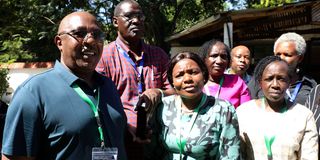
Kenya Secondary Schools Heads Association (KESSHA) National Chairperson Willie Kuria (left) with other officials and head teachers during Muranga Annual Conference in Mombasa on April 9, 2025.
Schools reopen this week for the second term even as headteachers pleaded with the government to urgently release funds for the longest session of the academic calendar often rocked by unrest.
During the term, the government is also set to announce the placement of Grade 9 learners who will be transitioning to senior school next year.
The Kenya Secondary Schools Heads Association (Kessha) national chairman, Mr Willy Kuria, urged the Education ministry to ensure capitation is retained at Sh22,000 and wired to schools urgently to help plan co-curricular activities that dominate the term.
“Things were very bad, we almost closed schools before time due to lack of funds. As we open schools, we have a balance of Sh2300 for term one to make it Sh11,000. Please release the monies. Give us the balance before you wire the capitation for the second term,” Mr Kuria pleaded.
The Muranga High School chief principal said lack of funds has in the past seen schools skip co-curricular activities which has resulted in riots by students.
“It is in this term that co-curricular activities are in plenty. If they miss to go for any co-curricular activities that is a sign of trouble. In the first term, we get 50 per cent of the capitation, in the second term we get 30 per cent. Funding in the second term is destabilized so sometimes we miss out on co-curricular because of lack of funds,” he explained.
Crucial term
Mr Kuria said the second term is the longest and most crucial term in the academic calendar as teachers try to complete the syllabus.
“It is a very busy term which will determine whether candidates will pass or fail their national exams. As teachers we work hard to complete the syllabus,” he noted.

Kenya Secondary Schools Heads Association (KESSHA) National Chairperson Willie Kuria (Third right) with other officials and head teachers during Muranga Annual Conference in Mombasa on April 9, 2025.
He added: “It is a term where disturbances like strikes occur because we have mocks and other trial exams and some students are unprepared hence the disturbances. So principals have to be very alert for any signs of instability.”
The term which begins on April 28 will run for 14 weeks until August 1. According to the 2025 academic term dates, the learners will break for half term for five days from June 25 to June 29.
Schools will close in August for three weeks from August 4 to August 22 when learners will return for the third term.
In an interview with Nation, Education Cabinet Secretary Julius Ogamba assured he will ensure the funds are transferred to schools on time.

Education Cabinet Secretary Julius Ogamba addressing Principals during the Kenya National Schools Principals Forum in Mombasa on April 23, 2025.
“The capitation was supposed to be Sh22,000 and for the longest time, I do not think that figure has been released because of the difficulties we have as a country. But we are working towards ensuring at least Sh22,000 is released within the financial year,” Mr Ogamba said.
Release funds
He said his ministry had been pushing Treasury to release the funds before schools reopen.
At the same time, the head teachers association has urged the ministry to withdraw a court case on e-citizen.
This is after the government said it will appeal the High Court ruling that declared illegal the directive requiring parents to pay school fees through the e-Citizen platform.
The government had directed parents to pay school fees via the platform.
However, the High Court found that the directive by the ministry violated the rights of parents and guardians by imposing a financial burden, as it excluded those without internet or digital payment methods.
“Withdraw the appeal. If there is a challenge in releasing capitation, imagine the government getting school fees. How will we survive?” Mr Kuria asked.
Mr Kuria said school fees should be paid directly to the institution’s accounts. Parents, he added, have had challenges paying school fees via e-Citizen due to cost implications.
However, the CS said the government requires all payments to go through the platform. “Let us see how the appeal goes,” Mr Ogamba responded.
Basic Education Principal Secretary Julius Bitok said the plan to pay school fees through e-Citizen is intended to safeguard parents and guardians from potential exploitation by rogue school administrators.






